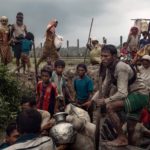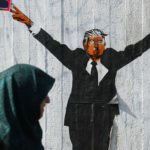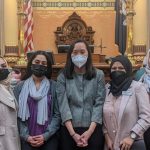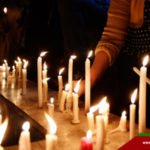Monroe Twp, On May 23, 2019, Muslims for Peace held their annual interfaith dinner during the Muslim holy month of Ramadhan. The gathering was held with speakers from different faiths and backgrounds sharing their traditions as well as thoughts on unity and peace.
It was a perfect theme in relation to the fasting month as the MC explained that the fasting month is a period of renewal spiritually and materially for humankind. It allows one to spiritually reconnect with the Divine; and in terms of materially, to understand the impoverished conditions in which people live without adequate nourishment around the world. Therefore, part of the goal of this gathering was to continue to share the blessings of Ramadhan with the diverse community.
Mehdi Hussaini from the Muslims for Peace organization spoke stating the importance of holding similar events whereby people from different communities can come together and break bread, illustrating that we are all human beings that are equal in humanity. He emphasized that we share more similarities than differences and we need to be reminded of this. He narrated a story of Imam Ali, the cousin of the Holy Prophet who had just become the caliph and when he reached a street corner he saw an old man begging for money. He asked those with him why was he sitting there. He was told that he was a Christian who did not have family and just wanted money. The Imam remarked, how strange is this society that when he was young and able-bodied you used him for work, now that he is old and he needs help, you have abandoned him. How can we call ourselves human beings? He immediately said I want you to take this man to the treasury and set him up with a pension so that he may be supported. He is still a human being, a creation of God and we should treat him as such. Hussaini expressed that this is the spirit one should leave the event with, seeing each other as equals in humanity because it is now our responsibility to look above all labels.
Thereafter the resident scholar Maulana Rizwan Rizvi of Masjid-e Ali in Somerset, New Jersey begin with chapter 2 verse 183 of the Holy Quran. This verse was revealed to the Muslims during the Prophet’s mission advising that fasting has been ordained upon you in the same way that it was an obligation upon those before you. The Maulana explained that fasting was not a new phenomenon at the time, but has always existed. Christians, Jews and those of other faiths have also fasted in one form or another.
He related the benefits of fasting that was mentioned at the end of the verse which was to become pious. He further explained to become pious is to remember those who are less fortunate in the world because hunger and thirst create softness in the heart makes one more prone to helping others. Thus, piety is to feel the pain of others. He continued to say that in the month of Ramadhan, it is easier to fast because it is collectively done. Likewise coming together here, like anything done in a congregation, has a more lasting effect. Maulana Rizvi further pointed out that the word ‘religion’ in the Quran is used as a singular word not in the plural just as there is one Book, but different editions. He further said the Lord is the same and so is the message which brings us all together.
Sweta Patel representative of BAPS Shri Swaminarayan Mandir, in Robbinsville, New Jersey brought a Ravi to recite the passages from the Hindu scripture in Sanskrit, which was written years ago that prayed for peace. She read the translation; thereafter, she briefly mentioned an inspirational poem that was delivered by their fifth spiritual leader on unity at the UN peace summit in 2000. He had said the importance should not lie in creating one religion, but creating one, that is being unified. When we are at peace with ourselves and at peace with people only then can we be at peace.
Soon after, Ali Moosvi Begin by analyzing the shootings that had recently occurred. He found similarities in these tragic events. For one, the victims were peaceful worshippers, secondly, the culprits possessed hate. Consequently, Now more than ever we have to face hate together. Moosvi Further remarked that it is the scriptures that can unite us together. He then quoted chapter 2, verse 156 of the Holy Quran that states, there is “No compulsion in religion.” Hence, God has given man the freedom to choose their own religion. Consequently, he questioned how can we oppose or hate other religions. The speaker then established that Unity is the goal; yet, it is important to discuss misconceptions and one of the misconceptions which he mentioned is that Islam is a religion of terror. Over 90 percent of the shootings that occurred was by white males or lone wolves. Thereafter, Ali offered the various achievements that can result by interfaith dialogue such as the sharing of information and resources for protecting places of worship, to feed the hungry and homeless together, to discuss issues relating to family values such as social ills and to establish free health clinics. He suggested to unify in opposing endless wars because every religion opposes war and killing thus, we too must oppose war; specifically, on countries of Venezuela and Iran. Finally, to always be with the oppressed. He stated when we work together, we bring the world together and when we do that God comes closer to us.
Thereafter, Jerrmein Abu Shahba, a Medical and Islamic researcher spoke about the miracles of the Holy Quran since it was in the holy month of Ramadhan that this holy book was revealed. She brought forth verses of the Quran that predicted phenomena that were later to occur. For instance, the verse that states, “Corruption has spread on land and sea because of what man’s hands had wrought.” Thus, the pollution caused by human beings which have spread in the land and the sea by fumes from factories and chemical waste has created a hole in the ozone. Ms. Abu Shahba continued to mention multiple prophecies of the Quran demonstrating it to be a word of truth and words from the Prophet by God.
Right after Andy Paluri member of Monroe Township Board of Education spoke of his life experiences regarding religion. He had visited numerous places of worship and found few things in common; for instance, the usage of water, most use water to put on the head and also the burning of some sort of scent. Furthermore, Mr. Paluri found that peace, harmony, and unity is what all religions preach. He said if you do not believe in these things, then you do not believe in God. He emphasized that everyone should visit different places of worship and take your children there.
Subsequently, representing the Sikh community was Harpreet Mangat. He spoke of his faith stating that it was a modern religion created about 500 hundred years ago, founded by Guru Nanak. He explained that the reason this religion came about was due to the great division between the Hindus and the Muslims that existed; for that reason, Guru Nanak tried to find a synthesis between the two and that is how Sikhism was born. Consequently, the belief in one God exists and all paths lead to the same place. Guru Nanak came from a wealthy family but he shunned wealth and lived with three basic principles: to help others, to work really hard, and to always remember God. Mr. Mangat further spoke on the life of Guru Nanak stating that he journeyed as far as Tibet and Mecca while spreading his message over a period of 23 years on foot and also became well versed in several languages so that he could understand all the religious texts and become conversant with anyone who spoke to him about it. He expressed that the main principle to be called a Sikhs is to defend not only your religion but also to defend everyone else from practicing their own.
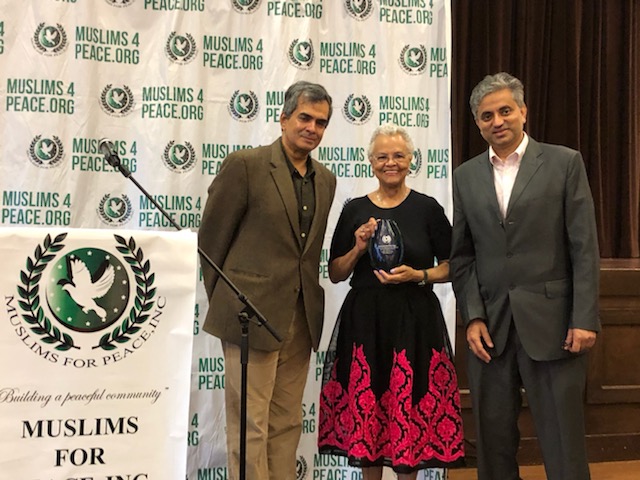 Congresswomen Bonnie Watson then spoke. She is a US representative of New Jersey 12th congressional district. She mentioned that she resides in a very diverse district of faith and ethnicities. She elaborately made a point that the greatness of the country lies in the freedom to believe in whatever we wish to believe in and to be safe in that space. The Congresswomen shared the teachings of Jesus who taught that love is the most important thing that we should embrace. She remarked about the difficult times we are living in and about her belief in a purposeful God, that there is a purpose even in the experiences that we are facing, which is to make us stronger and to bring us together. She implored that we cannot fight evil alone and goodness will prevail over evil as long as good people do not sit silently by.
Congresswomen Bonnie Watson then spoke. She is a US representative of New Jersey 12th congressional district. She mentioned that she resides in a very diverse district of faith and ethnicities. She elaborately made a point that the greatness of the country lies in the freedom to believe in whatever we wish to believe in and to be safe in that space. The Congresswomen shared the teachings of Jesus who taught that love is the most important thing that we should embrace. She remarked about the difficult times we are living in and about her belief in a purposeful God, that there is a purpose even in the experiences that we are facing, which is to make us stronger and to bring us together. She implored that we cannot fight evil alone and goodness will prevail over evil as long as good people do not sit silently by.
Rabbi Marc Kline started by stating that it is the lack of civility for each other that brought us this current government. He explained when you seek power over somebody else, it is a power that you have over somebody else regardless of what you call it. For people of faith, this type of power should not exist; rather, empowerment should, which is to take care of each other.
The Rabbi then inspirationally shared that he had gotten past the term interfaith because he felt that there is one faith, that is, faith in God.
Pastor Susan Rack, a field education supervisor at Princeton, then took to the podium. She spoke on differences pointing out the differences we have are important. She elaborated that the challenge to us is to remember our unity while enjoying our diversity. She then quoted words from her tradition saying, “We love God but it was God who loved us first. So let us love God and let us love another as God has loved us”.
The next speaker was Rev. Bob Moore who is associated with the dioceses of New York. He spoke of his experiences when associating with people of other traditions. He said he was once given pushback from his own community when running a food pantry that took care of others, not just Catholics. Some of his own people questioned him, “Why are you taking care of people who are not Catholic?” and Rev. Moore said, “We don’t take care of them because their Catholic, we take care of them because we are Catholic.” Rev Moore elaborated that each tradition takes care of each other based on that fact that each person has dignity because we are made in God’s image and likeness. The Reverend then related a story of when fascism was growing in Italy, a lady went to a priest and asked, what are we going to do?” The priest said, “I don’t know what we are going to do, but let me tell you what keeps tyrants up at night, it’s the old women who get up in the middle of the night goes to the town square and scrolls “No” on the town wall. its people who take these actions that takedown powers of injustice.”
Towards the end of the program, Father Dennis Berry a servant of the Most Holy Trinity and member of his general counsel spoke. He mentioned that two years ago he was invited for a Christmas party hosted by the Muslims For Peace in Trenton. He said he did not know who they were but found that they threw a Christmas party for the poorest Baptist families in that area of Trenton. In this party, he was invited to hand out presents. Father Berry was so moved by the organization’s kindness and generosity that he took the time to thank MFP for all that they do.
Dr. Alex Kharazi is a director and vice president of MFI and president of Franklin Township Interfaith Council as well as a physician. The Doctor left everyone with a message and pro-active deed. He reminded the audience that the first Thursday of May is National Day of Prayer. It is only on that day the entire nation comes together in prayer. Thus, different faith traditions were reading the prayer on that day in his Franklin Township, and the common theme was peace, love, hope, justice, charity, compassion, and unity. He questioned that if faiths promote all of these, then why do we have so much the opposite? Why kill each other in the name of religion and forget the teachings of their faith. Dr. Kharazi answered it boils down to being selfish, uneducated, and believing that “my way is the only way’. He cited the Quran in Chapter 16, verse 25 which speaks about inviting others to a dialogue which is an example of this gathering of opening hearts and minds regardless of skin color and gender. Henceforth, this year’s theme for National Day of Prayer was love for one another. Subsequently, he invited everyone to pledge to love one another who are especially different from us. Either to hire someone based on merit and not skin color, to welcome the neighbor that does not look like you or to vote for those who promote unity and peace. Thus, he wound up by stating that this is a month to become closer to God, to show compassion, engage in charity, extra prayers and to be kind to others and to continue these behaviors all year long.
After the speeches, everyone then ate together sharing in the meal with those who had fasted in the day.



